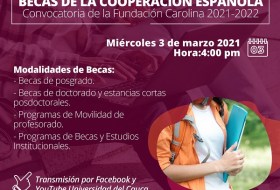News
Unicauca socializes Spanish Cooperation Scholarships for postgraduate and institutional studies
The call is open until March 17, at 9 in the morning, Spanish time.
https://www.facebook.com/watch/?v=2854299548224248
Within the framework of the Spanish Cooperation Scholarships and the Spanish Agency for International Cooperation and Development (AECID), the Carolina Foundation launched its XXI Call for applications for the academic year 2021 -2022.
In this sense, the Carolina Foundation offers different training opportunities through the international cooperation that characterizes Spanish foreign action, which is why in this edition of its call it offers a total of 504 scholarships: 225, for postgraduate studies; 85 for doctorate and postdoctoral short stays; 27 correspond to faculty mobility and 37 to institutional studies, 130 doctoral renewals, 153 for academic programs and 136 for postgraduate programs, said Henry François Tarlín, advisor to the Office of Interinstitutional and International Relations of the University of Cauca.
The official indicated that coinciding with the International Day of Education and in the common framework of the "Spanish Cooperation Scholarships", in coordination with the Carolina Foundation and the Spanish Agency for International Cooperation and Development (AECID), these entities offer different training opportunities and development strategies in the Ibero-American Community of Nations, registered in the 2030 Agenda for Sustainable Development.
The academic programs of the new call for scholarships are linked to the so-called “Five Ps” of the 2030 Agenda: people, planet, prosperity, peace, justice and solid institutions with alliances that seek to generate social value in the academic, professional, and social environment and cultural, to respond to the challenges that give rise to the Sustainable Development Goals (SDG).
“The Sustainable Development Goals (SDGs) guide the training offer and classify master's degrees, along with scientific areas, in accordance with the recommendations of Spanish universities to incorporate the 2030 Agenda into the national academic framework. Consequently, the postgraduate academic offer is organized, as was done in the 2020-21 call, around people, the planet, prosperity, peace, justice, institutions and alliances, to understand development from participation, dialogue and negotiation between the actors with joint action programs, ”said Henry François Tarlín.
Programs that offer teaching flexibility to facilitate student participation were integrated into this training offer, so a hybrid training system was chosen.
In the modality of institutional scholarships, the “Sede Carolina” Research Stay Program was incorporated, to expand the research work in the Ibero-American field in social sciences, development studies and gender studies to face the gender gap that It exists in Engineering, Science, Mathematics and Technology programs, with a significant number of scholarships in areas such as public health, ecological transition, and sustainable urban planning.
The Carolina Foundation, which was established in October 2000 to promote cultural relations and educational and scientific cooperation between Spain and the other countries of the Ibero-American Community of Nations, offers scholarships for postgraduate, doctoral and short post-doctoral stays; also, for faculty mobility programs, Scholarship programs and Institutional Studies.
The program also offers two types of support: scholarships and study aids, it combines official master's degrees, own degrees and specialization courses to increase the number of official degrees and scholarships with official degrees. The call for doctoral scholarships, short stays, teacher mobility programs and institutional studies will remain open until April 8.
The associated Latin American and Spanish institutions are in charge of applying to the applicants to opt for the scholarships before the Carolina Foundation, a public-private entity that through higher education covers all areas of knowledge, for which it works in a network with Ibero-American academic institutions, concluded the advisor of the Office of Interinstitutional and International Relations of the University of Cauca.
More Info:
Office of Interinstitutional and International Relations


